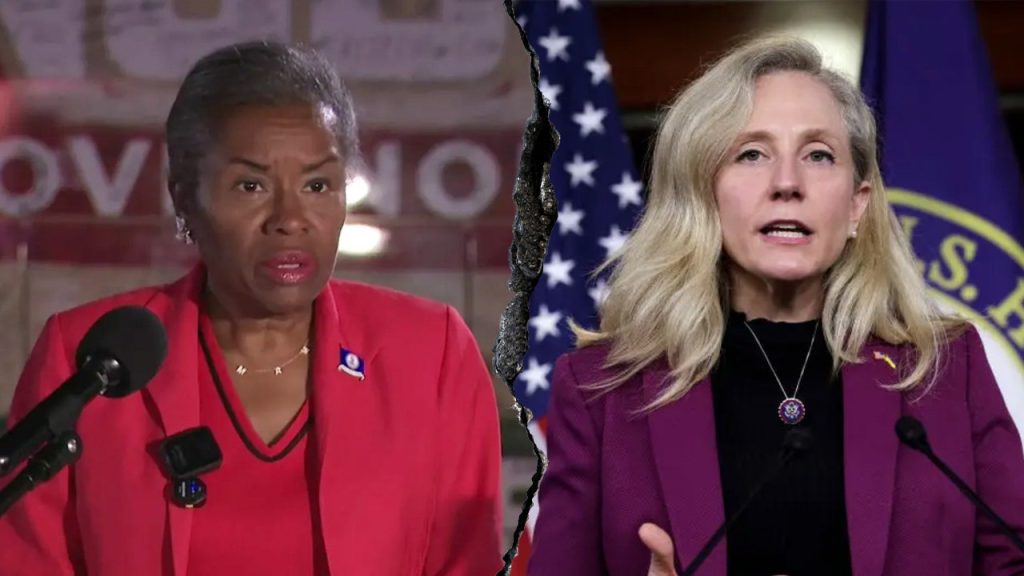A Tense Debate Between Virginia’s Lieutenant Governor and Congressional Candidate
In a heated debate in Norfolk, Virginia, Lieutenant Governor Winsome Earle-Sears and former Representative Abigail Spanberger showcased starkly different approaches to both policy and personal interaction. The televised exchange highlighted the growing tension in Virginia’s political landscape as election day approaches. Throughout the debate, Earle-Sears directly confronted Spanberger, repeatedly pressing her opponent on controversial text messages sent by Democratic attorney general candidate Jay Jones that described violent thoughts toward a Republican leader. The dynamic was visually striking—Earle-Sears made consistent eye contact and directed questions at Spanberger, while the former congresswoman largely avoided direct engagement, rarely looking at her opponent even when being directly addressed.
The most contentious moment came early when moderators asked Spanberger about Jones’ texts. Though Spanberger stated she found the messages “absolutely abhorrent” and had “denounced them when I learned of them,” she notably did not provide a clear answer when pressed on whether Jones should drop out of the race—a position Earle-Sears has firmly taken. This prompted one moderator to directly note, “I didn’t hear an answer on [the Jones] question.” Earle-Sears later challenged Spanberger’s response, asking whether it would take Jones “pulling the trigger” to actually condemn what he had said about then-House Speaker Todd Gilbert. The Republican candidate continued to reference the controversy throughout the debate, using it to question Spanberger’s leadership abilities and judgment.
The candidates also clashed on transgender policies in schools, with moderator Tom Schaad repeatedly pressing Spanberger for direct answers on whether transgender girls should use female bathrooms and participate on girls’ sports teams. Spanberger offered a nuanced response about student safety, citing her background as a former federal agent investigating crimes against children and noting her endorsement from the Police Benevolent Association. However, when the moderator noted she hadn’t directly answered the question, Earle-Sears jumped in with the accusation that “my opponent will not answer the question because she voted for men nude in girls’ locker rooms”—a characterization that dramatically simplified the complex policy issue at hand but reflected the emotional intensity surrounding the debate topic.
When asked about their relationships with outgoing Governor Glenn Youngkin, both candidates took different approaches. Earle-Sears declined to disclose private conversations with the popular Republican governor but indicated she would continue their shared policy direction. Spanberger, taking a more bipartisan tone, identified Youngkin’s advancement of nuclear power in Virginia as an initiative she would continue if elected. This question highlighted the political calculation both candidates were making—whether to align with or distance themselves from Youngkin’s administration, which the moderators noted enjoys high approval ratings as he approaches the end of his term.
After the debate concluded, Virginia House Speaker Don Scott Jr., speaking on Spanberger’s behalf, accused Earle-Sears of applying a “double standard” by demanding Jones withdraw while allegedly not condemning former President Donald Trump’s controversial rhetoric with equal vigor. Scott specifically referenced Trump’s comments about former Wyoming Representative Liz Cheney, though fact-checkers and the Trump campaign have disputed characterizations of those remarks as calling for violence. The post-debate comments underscored how national political figures and controversies continue to influence state-level campaigns, with both sides attempting to connect their opponents to the most controversial elements of their respective parties.
The Earle-Sears campaign, in a statement following the debate, emphasized what they viewed as their candidate’s stronger leadership presence, noting that “Abigail Spanberger couldn’t even look Lt. Gov. Earle-Sears in the eye and confirmed she will not stand up to Jay Jones’ threat-laced, murderous rhetoric.” The statement concluded with a pointed assessment: “If she can’t lead her own ticket, she can’t lead the Commonwealth.” The debate encapsulated the highly personal nature of this race, where matters of character, association, and communication style have taken center stage alongside policy differences—reflecting the increasingly polarized nature of American politics at all levels of government. As Virginia voters prepare to make their decision, the contrast between these two accomplished women couldn’t be more pronounced, not just in their political positions but in their fundamental approach to political communication and leadership.














